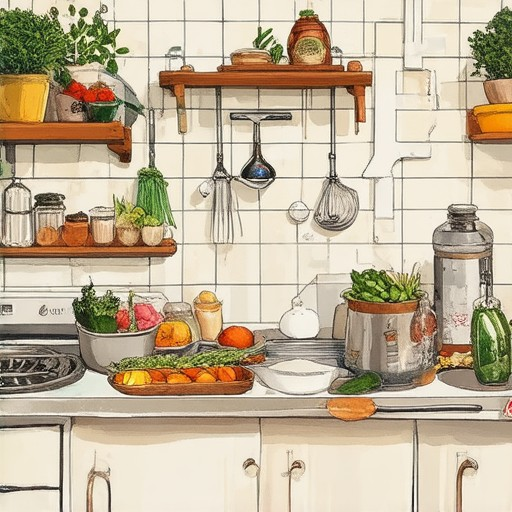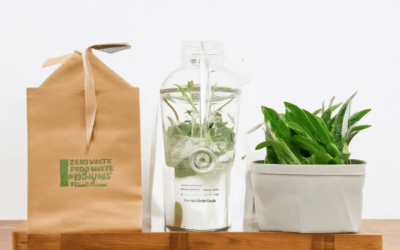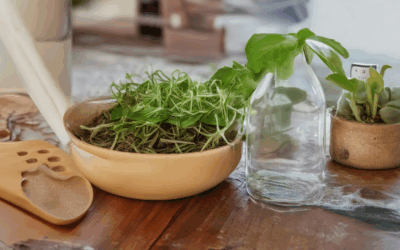Transforming your kitchen into a haven of sustainability doesn’t have to be overwhelming. With the rise of eco-conscious living, adopting eco-friendly kitchen tools and sustainable products has become easier than ever. From reducing waste to promoting environmental health, these tools are not just trendy—they’re essential for modern households. Whether you’re aiming to cut down on plastic use, minimize food waste, or simply want to create a greener space, this guide offers insights into the best eco-friendly kitchen tools and sustainable products that can make a difference. By making informed choices, you can enjoy a kitchen that’s both functional and environmentally responsible, paving the way for a healthier planet and a better lifestyle.
Key Takeaways
– Adopt a zero-waste kitchen mindset for a sustainable lifestyle, minimizing food waste and maximizing ingredient use.
– Use every part of your ingredients, from peels to stems, to reduce waste and enhance cooking.
– Shop mindfully and bulk buy to cut down on unnecessary purchases and food spoilage.
– Repurpose ingredients through fermentation, pickling, or preserves to extend their shelf life.
– Choose sustainably sourced, locally grown products to support eco-friendly practices.
– Incorporate composting to recycle kitchen scraps into nutrient-rich soil.
– Invest in multi-functional kitchen tools to maximize ingredient potential.
– Explore zero-waste cooking trends to reduce food waste and donate surplus to those in need.
– Understand that kitchen waste is biodegradable and can be composted for sustainable practices.
– Embrace a culture of awareness to reduce global food waste and promote eco-friendly habits.

Most Eco-Friendly Cooking Utensils
Eco-friendly cooking utensils are essential for reducing your kitchen’s carbon footprint while promoting sustainable living. By choosing the right materials, you can minimize waste and exposure to harmful chemicals.
- Wooden Utensils: Opt for bamboo or wooden spatulas, ladles, and chopsticks. These are biodegradable and require less energy to produce compared to plastic alternatives.
- Bamboo Utensils: Bamboo is a rapidly renewable resource, making it an excellent choice for eco-conscious kitchens. Look for bamboo cutting boards and utensils in sustainable materials.
- Stainless Steel Utensils: While not 100% recyclable, high-quality stainless steel is durable and free from harmful chemicals. Choose brands like Eco Planet Verde for responsibly sourced options.
- Silicone Utensils: Silicone spatulas and measuring cups are heat-resistant and lightweight. They are reusable and often made from food-grade materials.
- Ceramic and Glass Measures: Use ceramic or glass measuring cups and bowls instead of plastic. These materials are non-toxic and can be reused indefinitely.
Why Choose Eco-Friendly Utensils?
By selecting eco-friendly cooking utensils, you reduce your reliance on single-use plastics and minimize the risk of exposure to harmful chemicals found in conventional products. Many traditional utensils contain bisphenol A (BPA), which can leach into food and drinks, posing health risks.
Sustainable Kitchen Habits
To maximize the benefits of your eco-friendly utensils, adopt sustainable kitchen practices such as composting organic waste, using reusable containers, and investing in multi-purpose tools like versatile kitchen gadgets . This ensures your culinary efforts align with environmental goals.
What Are Eco-Friendly Kitchen Products?
Eco-friendly kitchen products are items designed to minimize environmental impact while performing everyday tasks. These products often replace traditional options made from harmful materials with sustainable alternatives.
- Bamboo Cutting Boards : Durable and sustainable alternative to wood or plastic boards.
- Reusable Cloth Napkins : Reduce paper towel waste by using washable, eco-friendly cloths.
- Glass Food Storage Containers : Reusable and free from BPA, perfect for storing leftovers.
- Eco-Friendly Sponges : Made from biodegradable materials like vegetable-based fibers.
- Sustainable Cleaning Supplies : Such as plant-based detergents and non-toxic cleaning solutions.
- Compostable Trash Bags : Made from biodegradable materials to reduce landfill waste.
- Cork Wine Openers : A sustainable alternative to plastic or metal openers.
- Recycled Steel Spoons : Durable and made from recycled materials to minimize waste.
- Herb Gardens : Grow your own herbs in small pots or windowsills, reducing plastic packaging use.
- Eco-Friendly Water Bottles : Made from stainless steel or BPA-free plastic to reduce plastic bottle waste.
By incorporating these eco-friendly kitchen products into your routine, you can significantly reduce your carbon footprint while creating a more sustainable home environment.

What Are Eco-Friendly Tools?
Eco-friendly tools are designed to minimize environmental impact while delivering functionality. These tools often use recycled materials, are biodegradable, or have a reduced carbon footprint. They play a crucial role in promoting sustainable living and helping individuals make eco-conscious decisions.
Here’s a breakdown of popular categories and examples:
1. Hand Tools
- Recycled Metal Tools : Made from scrap metal, these tools are durable and contribute to waste reduction.
- Biodegradable Handles : Composed of natural materials like bamboo or hemp, these handles decompose over time.
- Solar-Powered Tools : Devices powered by solar energy, reducing reliance on fossil fuels.
2. Kitchen Gadgets
- Compostable Cutting Boards : Made from renewable resources, these boards reduce plastic waste.
- Eco-Friendly Sponges : Manufactured from plant-based materials or recycled fibers, they’re gentle on the environment.
- Non-Toxic Cleaners : Chemical-free options that are safer for people and the planet.
3. Outdoor Equipment
- Reusable Water Bottles : Durable and leak-proof, these bottles encourage hydration without single-use plastics.
- Eco-Friendly Lawn Mowers : Electric models with rechargeable batteries reduce emissions compared to gas-powered ones.
- Natural Pest Control Tools : Such as traps or organic pesticides, minimizing harmful chemicals.
4. Personal Care Items
- Recycled Toothbrushes : Made from sustainable materials, these reduce plastic waste.
- Biodegradable Razors : Blades made from renewable resources or compostable handles.
- Eco-Friendly Skincare Products : Ingredients sourced sustainably and packaged minimally.
Benefits of Eco-Friendly Tools
- Reduction in Waste : By choosing durable and reusable items, we minimize landfill contributions.
- Energy Efficiency : Many eco-friendly tools are designed to be more energy-efficient, lowering overall consumption.
- Healthier Options : Non-toxic products promote better health and safety for users.
At Eco Planeta Verde, we advocate for mindful tool selection to support a greener lifestyle. Explore our collection of sustainable tools and discover how small changes can make a big difference. https://ecoplanetaverde.com/sustainable-tools .
By incorporating these eco-friendly tools into daily life, individuals can contribute to a healthier planet while enjoying the benefits of reliable and responsible products.

What is a Zero-Waste Kitchen?
A zero-waste kitchen is an approach to cooking and meal planning that minimizes food waste and reduces the environmental impact of household food production. This practice focuses on using every part of an ingredient and making the most efficient use of resources, from groceries to cooking tools.
Key Principles of a Zero-Waste Kitchen
- Reduce Food Waste : A core aspect of a zero-waste kitchen is minimizing the amount of food that goes uneaten. This can involve meal planning, portion control, and creative uses for leftover ingredients.
- Use All Parts of Ingredients : In a zero-waste kitchen, nothing goes to waste. Every scrap of an ingredient, such as peels, stems, or bones, is utilized in cooking or composted.
- Shop Mindfully : Buying only what you need and in quantities that prevent spoilage helps reduce waste. Bulk purchasing and shopping seasonally are common practices.
- Repurpose Ingredients : Techniques like ferments, preserves, and pickles allow ingredients to be used in multiple dishes, extending their shelf life and reducing waste.
- Sustainable Sourcing : Choosing sustainably sourced and locally grown products supports environmental health and reduces transportation-related emissions.
Benefits of a Zero-Waste Kitchen
- Environmental Impact : Reduces food waste, conserving resources and lowering carbon footprint.
- Cost Efficiency : Minimizes waste, leading to better use of budget and fewer trips to the store.
- Healthier Lifestyle : Encourages eating fresh, nutrient-dense foods and reduces exposure to processed goods.
Tips for Achieving a Zero-Waste Kitchen
- Plan Meals Thoroughly : Create a weekly meal plan based on what you have and what you need, ensuring minimal overlap and waste.
- Utilize Composting : Collect scraps and peelings for home composting, turning kitchen waste into valuable soil amendments.
- Invest in Multi-Purpose Tools : Tools like slow cookers, pressure cookers, and blenders can help extract maximum use from ingredients.
- Explore Fermentation and Preserving : Learn techniques like kimchi-making or jarred fruits to preserve surplus ingredients.
- Join Online Communities : Connect with others who share a passion for zero-waste living to gain tips and inspiration.
By adopting a zero-waste kitchen mindset, individuals can contribute positively to environmental sustainability while enjoying delicious, nutritious meals. Learn more about sustainable living .
Is Kitchen Waste Biodegradable?
Kitchen waste is biodegradable because it consists of organic materials such as food scraps, vegetable peels, and eggshells, which can be broken down by natural processes involving bacteria, fungi, and other organisms. This decomposition typically occurs through composting, where kitchen waste is converted into nutrient-rich soil, aiding in sustainable practices.
Biodegradable waste differs from non-biodegradable waste, such as plastics, metals, and glass, which cannot be naturally broken down and pose environmental hazards. Proper disposal methods, like composting, help manage kitchen waste effectively, reducing landfill dependency and promoting eco-friendly habits.

What is the Zero-Waste Cooking Trend?
Zero-waste cooking is a culinary practice focused on minimizing food waste in the kitchen. It involves two main approaches: using surplus ingredients to create meals and donating leftover food to those in need. This trend aligns with broader sustainability goals by reducing environmental impact and promoting responsible resource use.
Benefits of Zero-Waste Cooking
- Environmental Impact : Reduces food waste, contributing to lower methane emissions and conserving natural resources.
- Cost Efficiency : Utilizes ingredients that might otherwise go unused, saving money for chefs and households.
- Sustainability : Supports a circular economy by repurposing materials and reducing waste streams.
Key Practices
- Ingredient Utilization : Chef’s often experiment with recipes that use every part of an ingredient, such as vegetable peels or citrus rinds, turning scraps into flavorful dishes.
- Leftover Donation : Partnering with local charities or food banks to distribute surplus food, helping communities in need while reducing landfill contributions.
Global Perspective
Globally, approximately 40% of food is wasted, with significant portions occurring in the culinary sector. Implementing zero-waste strategies can help reduce this statistic, fostering a culture of awareness and responsibility.
Resources for Adoption
Eco Planeta Verde offers valuable tools and guides to adopt zero-waste practices. Explore our blog for tips on sustainable cooking, ingredient management, and creative recipe ideas. Visit Eco Planeta Verde to learn more.
By embracing zero-waste cooking, we can collectively make a meaningful difference in preserving the planet for future generations. Start small, experiment with new recipes, and consider the environmental impact of every decision in the kitchen.




0 Comments